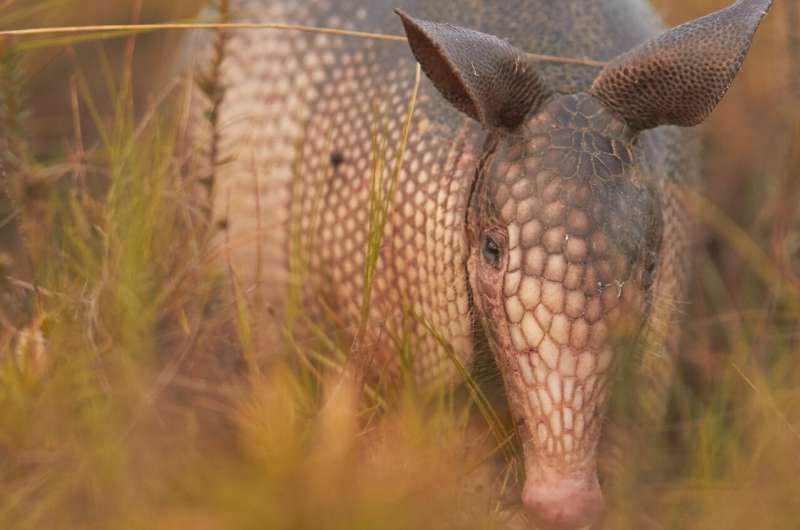June 29, 2024 report
This article has been reviewed according to Science X's editorial process and policies. Editors have highlighted the following attributes while ensuring the content's credibility:
fact-checked
peer-reviewed publication
trusted source
proofread
Saturday Citations: Armadillos are everywhere; Neanderthals still surprising anthropologists; kids are egalitarian

The coolest news this week concerns anthropological research combining state-of-the-art imaging technology, medical diagnostics, genetics and sociology. We covered the implications of a black hole in an expanding universe and the eternal question researchers like to ask about children: Are they actually good people? We could go back and forth on that, but current research has landed on "yeah, pretty good, we guess." Also: Forget everything you ever knew about armadillos, the Abrams tank of mammals.
Neanderthals were nice, say anthropologists
A multidisciplinary team of anthropologists reported the first discovery of skeletal remains of a Neanderthal child with Down syndrome in a cave in Valencia, Spain. The find has major implications for the social lives of Neanderthals and sheds light on the altruism of archaic humans. Micro-computed tomography scans of the child's right temporal bone showed a congenital inner-ear malformation associated with Down syndrome. The child, who the researchers named Tina, survived to about six years of age, but would have required extensive care from adults.
Researchers have known for decades that Neanderthals provided care for disabled adult individuals, which has created a debate about whether this represented altruistic care or reciprocal exchange of help between equals. But the new find is a case of an individual who received help even if they couldn't reciprocate.
Taxonomy elucidated
There are a lot of gardeners in my family, so I grew up under the influence of people who really hate armadillos, which would dig up my aunt's root vegetables with what she described as "their nasty little noses." She put a chickenwire fence around the garden years ago, but she is still extremely quick to point out that they're the only species besides humans that can carry Hansen's disease. The Texas state animal, ladies and gentlemen!
For a long time, researchers considered nine-banded armadillos to be the most widespread invasive armadillo species in the United States, but a new study from a multi-institutional research group finds that these guys actually represent four genetically distinct species, including one that is completely new to biology.
By assembling an unusually large sample set of nine-banded armadillos, the team was able to identify differences in physical characteristics and DNA across the wide range of the U.S. armadillo cohort. The nine-banded armadillo, now called Dasypus mexicanus, has three subspecies that have been elevated to their own distinct species; a fourth, which ranges in northeastern South America, is no longer considered to be among these relatives and is now called Dasypus guianensis. These species have highly similar morphological characteristics and are difficult to distinguish in the field.
Universe increasingly expansive
A new paper posits that a closed universe must have a constant and positive energy density. Therefore, the Hubble parameters at the event horizon of every centrally symmetric black hole must be equal, black holes do not expand with the expansion of the universe, and different parts of the universe are expanding at different rates. Nikodem Popławski, a distinguished lecturer at the University of New Haven, says that according to Einstein's equations, the only energy at the event horizon of a black hole is dark energy, the unknown force driving universal expansion. Popławski expands on the original concept of a black hole, which in the early 20th century was assumed to be a perfectly round object in an unchanging universe.
But the discovery in the 1990s that the expansion of the universe is accelerating demands a reconception of that model, and Popławski's calculations are based on a massive, centrally symmetric object in an expanding universe. His paper finds that the statistically significant discrepancy in measurements of the rate of acceleration of universal expansion (the "Hubble tension") are "a natural consequence of a correct analysis of the spacetime of a black hole in an expanding universe within Einstein's general theory of relativity," and thus accurately reflect that regions of the universe are expanding at different rates.
Children are nice, like Neanderthals
Are children capable of egalitarian behavior? I mean, yes, obviously they are, as anyone who grew up with fairness-obsessed siblings can attest. But there's something about altruistic human behavior that always prompts researchers to ask whether children are also capable of exhibiting similar traits, which kind of suggests an implicit bias among researchers with regard to the empathetic potential of children. Did a child steal their grant money? Anyway, a multi-institutional collaborative of researchers report in Child Development that children notice inequalities in classroom settings and are motivated to correct unequal or biased treatment by teachers to their peers.
They focused on white and Latinx children as they comprise the largest majority and the largest ethnic-racial minority in the region in which they collected data, interviewing kids aged eight and 14 years old about teacher-generated biases in the assignment of important leadership roles. They showed the study participants images of a teacher selecting students for different leadership duties in which only girls, only boys, only white students or only Latinx students were selected.
Adolescents more than children were likely to view unequal teacher allocations negatively in the context of group-based inequalities—favoring white students over Latinx students was perceived more negatively than equal allocations. However, both age groups felt negatively if someone from their group was not selected for leadership duties. The researchers believe their findings could contribute to new interventions designed to create fair and just classrooms.
Journal information: Child Development
© 2024 Science X Network





















